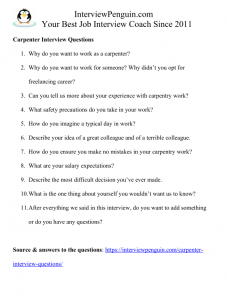You do not have to be concerned about your future as a carpenter. People will always demand new furniture, kitchen cabinets, and wooden decorations for their homes. And someone has to design and build bridges, highways, and other public structures. The future is bright for the men and women of the craft, and you will always find some vacancies for carpenters, or their assistants, including entry level positions.
But what will happen in an interview for this interesting job? What questions will they ask you? And what should you tell them to convince them about your readiness for the job? We will try to find the answers while analyzing 10 common questions you may face. Let’s start!
Table of Contents
Why do you want to work as a carpenter?
Try to focus on the future, not on the past. Saying that you want to work as a carpenter because you studied carpentry on a vocational school or because you had the same job in the past would indicate a must rather than a desire to have the job. Hiring managers should get an impression that you apply for the job because you want to, and not because you have to.
Talk about your passion for woodwork. Say them that you enjoy to see the results of your work, to have something you can show to your friends or children and say: “Look, I’ve built this”. Not many people have such a luxury in their jobs…
You can also say that you believe to have the skills and personality of a great carpenter. Attention to detail, precision, persistence, and ability to read blueprints and visualize your work accordingly, are on the list of your strengths.
To sum it up, you enjoy doing what carpenters do, and have what it takes to become a great carpenter. That’s a good enough reason to apply for the job…
Why do you want to work for someone? Why didn’t you opt for freelancing career?
You can certainly earn more money as a freelancer. But this choice also has some drawbacks, and you should refer to them as the reason why you opted for employment. Let me show you few good examples:
- You enjoy your work–that means drawing, planning, cutting, assembling, evaluating… But you do not enjoy the business side of freelancing as a carpenter–marketing, accounting, communication with the clients, etc. It is simply not your cup of coffee, or not even your strength, and hence you prefer to be employed in a company.
- You are looking for stability. Perhaps you have a family, or plan to start one in the near future. It’s nice to run your own business, but nothing is guaranteed in such a case. You may make seven thousand dollars one month and than nothing the next one… In your present situation, you simply do not want to (or cannot afford to) take such risks.
- You are just starting in your professional career. Somewhere, back in your mind, you have a plan to start your own business, maybe in the horizon of ten years. But firstly you need to gain experience and learn from skilled carpenters. That’s what you want to do right now, and you will see what happens in the future, whether you will start a business one day or not.
Can you tell us more about your experience with carpentry work?
The best thing you can do at this point is to show them your work portfolio. A simple collection of your best works (pictures of them, ideally in print).
Showing them one picture after another, you can explain what technique and power tools you used, what materials you worked with, and how you worked on each of your successful projects. To see something once is better than to hear about it a thousand times. If you do not have a portfolio yet, you should definitely make one before the start of your interview.
What’s more, you can show them also your hobby work, things you did in your own house, or in your free time, especially if you have no previous working experience. Maybe you just assisted a skilled carpenter, and didn’t do the planning or worked with the power tools, but it’s still an experience and you can definitely benefit from it in the job. Anything is better than nothing…
What safety precautions do you take in your work?
The worst thing that can happen to any employer is when one of their workers chops or cuts their own hand, or get injured because they did not wear the protective equipment.
Ensure the hiring manager that safety is your first priority. Before anything else, you will always wear protective clothes–gloves, glasses (or shield), boots and clothes with long sleeves. Wood shop is no place for shorts and t-shirt…
You will always test the power tools, work against the cutter, and you will never use blunt blades or bits. And, most importantly in 21st century, you won’t check your smartphone every 10 minutes, and you will actually turn it off while working, to minimize all possible distractions and to stay focused on your work. That way you will minimize the probability of an injury.
You can also add that you will pay attention to your colleagues in the wood shop or on the construction site–where they are standing, what they are doing, whether they wear protective equipment, etc, to ensure you won’t endanger them with your work.
How do you imagine a typical day in work?
In this case, the most important thing is to show realistic expectations. I mean, in some cases you may respond for some creative woodworking, and a variety of tasks, for example when you work for a company that specializes in homes remodeling. In such a case you may frame walls and partitions, put in doors and windows, build stairs, and do other interesting things.
In other cases, however, for example when working on some big construction site where dozens of carpenters are employed and cooperate together, you may respond for two or three tasks only, and these will repeat day after day. Such tasks can include constructing certain wooden forms or erecting scaffolding…
Read the job description carefully, and check also the website of your future employer. Try to understand what types of projects they work on, and consequently what tasks you will likely carry out each day to in your new job.
And if you are not sure, try to keep your expectations low. It’s okay to say that you expect to take care of three or four tasks (you will name them, following the job description) each day, while in fact you will respond for a variety of things.
But if you said that you imagined working on a variety of tasks, putting your creativity to the test, and in reality they only wanted you to construct wooden forms for pouring concrete, they would not hire you. That’s why it is better to keep your expectations low, at least if you aren’t sure.
5 other questions you may face in your interview for a job of a carpenter
- Describe your idea of a great colleague and of a terrible colleague.
- How do you ensure you make no mistakes in your carpentry work?
- What are your salary expectations?
- Describe the most difficult decision you’ve ever made.
- What is the one thing about yourself you wouldn’t want us to know?
- After everything we said in this interview, do you want to add something or do you have any questions?
* You can also download the list of all questions in a one page long PDF, and practice your interview answers anytime later:

Conclusion, next steps
Interview for a job of a carpenter belongs to easier interviews. They typically won’t ask you any difficult behavioral or technical questions.
What’s more, there’s a high demand for carpenters, and many skilled woodworkers opt for freelancing. It can easily happen that you will be the only job candidate–which certainly makes your situation easier, because you do not compete with anyone else for the job.
As long as you show some enthusiasm for carpentry, and demonstrate your readiness for the job–with decent answers to their questions (or any answers, just do not remain silent), and with the portfolio of your former works, they will typically give you a chance. They will hire you. I hope you will succeed and wish you good luck!
May also help you:
- Salary negotiation tips – There is always a chance to negotiate at least a slightly better salary offer at the end of your interview. Learn how you can do it.
- Bricklayer interview questions.
- Plumber interview questions.

